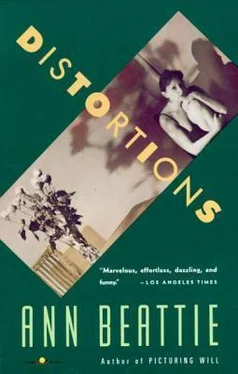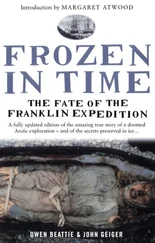Ann Beattie - Distortions
Здесь есть возможность читать онлайн «Ann Beattie - Distortions» весь текст электронной книги совершенно бесплатно (целиком полную версию без сокращений). В некоторых случаях можно слушать аудио, скачать через торрент в формате fb2 и присутствует краткое содержание. Год выпуска: 1991, Издательство: Vintage, Жанр: Современная проза, на английском языке. Описание произведения, (предисловие) а так же отзывы посетителей доступны на портале библиотеки ЛибКат.
- Название:Distortions
- Автор:
- Издательство:Vintage
- Жанр:
- Год:1991
- ISBN:нет данных
- Рейтинг книги:5 / 5. Голосов: 1
-
Избранное:Добавить в избранное
- Отзывы:
-
Ваша оценка:
- 100
- 1
- 2
- 3
- 4
- 5
Distortions: краткое содержание, описание и аннотация
Предлагаем к чтению аннотацию, описание, краткое содержание или предисловие (зависит от того, что написал сам автор книги «Distortions»). Если вы не нашли необходимую информацию о книге — напишите в комментариях, мы постараемся отыскать её.
Distortions — читать онлайн бесплатно полную книгу (весь текст) целиком
Ниже представлен текст книги, разбитый по страницам. Система сохранения места последней прочитанной страницы, позволяет с удобством читать онлайн бесплатно книгу «Distortions», без необходимости каждый раз заново искать на чём Вы остановились. Поставьте закладку, и сможете в любой момент перейти на страницу, на которой закончили чтение.
Интервал:
Закладка:
Eric Clapton’s Lover


Franklin Fisher and his wife, Beth, were born on the same day of March, two years apart. Franklin was thirty-nine years old, and Beth was forty-one. Beth liked chiles relenos , Bass ale, gazpacho; Franklin liked mild foods: soufflés, quiche, pea soup. How could she drink Bass ale? And it was beginning to show on her figure. It wasn’t just beginning to show — it was showing in more places, bulging actually, so that now she had big, fat hips and strong-man arms. Her disposition had changed, too; as she got larger, she got more vehement, less willing to compromise. Now she cooked two dinners and ate spicy lamb shish-kebob, smacking her lips, shaking on more salt, while Franklin, across from her, lifted a forkful of unseasoned spinach soufflé.
Things got worse between Franklin and Beth after Franklin Junior (“Linny” to his mother) got married and moved to San Bernardino. Their son’s bride was “learning to drive a rig.” She demonstrated how to turn a truck wheel coming down an incline by leaning forward on their sofa, spreading her legs, and moving her arms in what seemed to be two separate circles. Neither Franklin nor Beth knew what to talk to her about. Franklin Junior said, “Yes, sir!” as his bride-to-be simulated steering the truck. She talked about her rig, drank a shot of scotch, declining water or an ice cube, and left after half an hour.
“You’re sorry they’re moving so far away, aren’t you?” Franklin said to Beth.
“No,” Beth said. “She gives me the creeps.”
“Maybe she was putting us on,” Franklin said.
“What for?” Beth asked.
“Maybe she was high.”
“‘High,’ Franklin?”
“It could be,” Franklin said.
“You don’t understand anything,” Beth said.
“What do you think it meant?” Franklin asked.
“She was learning to drive a truck.”
“Why would she want to be a truck driver?” Franklin asked.
“It’s better than being a mother,” Beth said. “Then your kids grow up and marry truck drivers.”
“There’s nothing really wrong with driving a truck,” Franklin said.
“You don’t understand anything,” Beth said.
It was one of the last times Beth spoke to him at any length. The following morning she turned her head on the pillow to face him and said, “I must have a day of silence,” and wouldn’t talk all day. He tried a lot of questions, but nothing provoked a reaction. “Did you know that a silver teaspoon inserted in a bottle of Coke will keep it fizzy for two days after it’s opened?” he asked. Nothing.
The next morning she turned her head and said, “Another day of it.”
“Want to hear why Avon is losing business?” he asked at breakfast.
“Interested in Nixon’s phlebitis?” he called from the TV room.
“Would you like to adopt a Vietnamese child?” he whispered just before she dropped off.
On Monday Franklin went to work. He had worked on a magazine called Canning Quarterly and had just been promoted to editor of this magazine and another, Horizontal World , when his secretary said, “Congratulations, Mr. Fisher.” He smiled, then realized that there was nothing to smile about. Her first and last official duty was to type his letter of resignation. Now he had a new job, selling tickets at the movies. It was always very quiet on the job, people filing past with puckered lips: “Two, two, two …,” the tickets snapping through the metal slot on the countertop. When the movie started, Franklin got an orangeade and sat on his stool reading “Dear Abby,” hoping that she would deal with a problem similar to his own. She did not. She helped a daughter-in-law whose mother-in-law’s seeing-eye dog snapped at her ankles, a teen-ager who wanted to know how to peel her own face to get rid of acne, and a waiter whose restaurant did not take BankAmericard. There was also a “confidential” to T.S. in Portland, Oregon, saying that, yes, many unwanted babies were eventually loved.
Franklin usually called Beth after the second show began, just to say hello, but tonight he kept flipping through the paper, looking for guidance: a picture of Teddy Kennedy behind a podium, his cheeks stuffed with nuts that he intended to store for the winter; a picture of a cat — Mr. Tom Cat — and below that, “Please Save Me”; a warning about contaminated canned lima beans; two packs of pencils for the price of one. A teen-age girl came up to the counter. She wanted a Coke.
“The girl will be right back,” Franklin said.
Franklin smiled as the girl returned and got the teen-ager the Coke. The week before, when he was there early in the morning to look for his lost watch, he had seen the exterminators laughing at a mouse that was swimming inside the Coke tank.
Franklin hopped off the stool and lifted the phone off the hook. He expected at least a hello from Beth, but the phone rang once and then there was silence.
“Beth?” he said.
“I can hardly wait to get home to you, darling,” he said.
“Do you miss your beloved?” he asked.
He put the phone back on the hook. The girl behind the candy counter looked away just before their eyes met.
“There are mice in the Coke machine,” Franklin said.
The girl picked up a box of chocolate-covered raisins and moved to the far side of the counter.
“Mice. Swimming in there,” Franklin said.
“There are not,” she said. She moved farther away.
*
Instead of going to work, Franklin went to the racetrack. He stared at the horses, at their small heads, their straight ears, their big bodies, their delicate legs. How could such animals do anything? He bet on number one in the first race, “Fine ’N’ Fancy,” and lost In the next race he bet on number two, “Daddy’s Delight,” and lost again. He won in the next race by betting on number three, “Golden Gospel.” He stuffed his winnings into his trouser pockets and went out to the parking lot, where he had left his car. The aerial had been bent into an arc. Franklin got into the car and tried the radio. Static. Franklin got out, kicked the side of the car below the aerial, got back in and drove away. He drove until he got to the seamy part of town. He locked his doors and drove slowly down the main street, looking for — or thinking about looking for — a woman. At a McDonald’s he double-parked and got out. A young black woman was twisting a mulatto child’s arm behind its back, yelling, “Do you understand?”
“Sir?” the boy behind the counter said as Franklin approached.
“I don’t want any of this awful shit,” Franklin said and started away. He patted the head of the child whose arm was being twisted on the way out.
A Puerto Rican girl was sitting on the hood of his car, swinging her legs. She had on bright-blue platform shoes with blue plastic bows on the ankle straps.
“Your car?” she said, hopping down.
“Want to get inside?” Franklin asked, drawing the money out of his pocket.
“No,” the girl said.
“Were you going to eat at McDonald’s?”
“No,” she said.
“Because if you were, I could take you someplace nicer for dinner.”
“What for?” she laughed. She had a broken front tooth. She had on orange lipstick.
“Company,” he said.
“You’re not that bad,” she said. “Don’t you have a girlfriend?”
“You’re right,” Franklin said. “I’m not that bad. I just don’t have my girlfriend with me at the moment, so I thought you might want to go to dinner with me.”
Читать дальшеИнтервал:
Закладка:
Похожие книги на «Distortions»
Представляем Вашему вниманию похожие книги на «Distortions» списком для выбора. Мы отобрали схожую по названию и смыслу литературу в надежде предоставить читателям больше вариантов отыскать новые, интересные, ещё непрочитанные произведения.
Обсуждение, отзывы о книге «Distortions» и просто собственные мнения читателей. Оставьте ваши комментарии, напишите, что Вы думаете о произведении, его смысле или главных героях. Укажите что конкретно понравилось, а что нет, и почему Вы так считаете.












